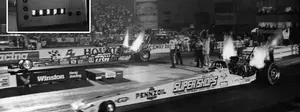Houston 1988: A real thrill for Eddie Hill and NHRA's first four-second passes
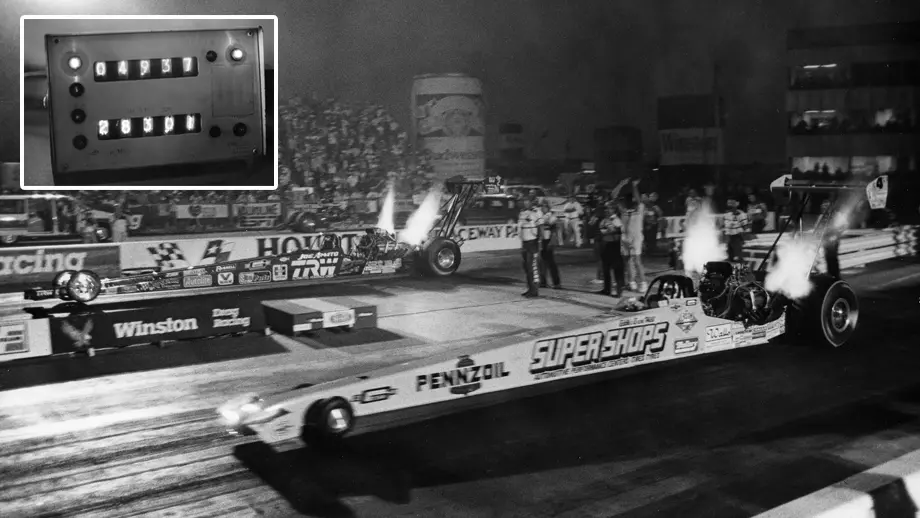

Eddie Hill won the 1988 Supernationals in front of his home-state fans in Houston, and while it certainly wasn't easy, it was very thrilling.
|
What if Bobby Thompson had run out of baseball bats before clobbering the home run that let "The Giants win the pennant! The Giants win the pennant!"? What if Franco Harris' jar of stickum was empty before "The Immaculate Reception"? What if Mike Eruzione was still on the bench looking for tape for his hockey stick instead of on the ice to score the decisive goal against the Soviet Union in Team USA's 1980 Olympics "Miracle On Ice"?
And what if Earl Whiting hadn't been there for Eddie "the Thrill" Hill at the 1988 Supernationals?
Okay, maybe that's stretching things a bit, but if "the likable logger" hadn’t loaned Hill a supercharger to continue at the event, Hill never would have staged one of the all-time great comebacks that was topped by one of the all-time great runs in Top Fuel history.
In Thursday qualifying, Gene Snow assured himself –- and the event –- a place in NHRA history when he zoomed to a 4.997-second clocking, the first sub-five-second pass at an NHRA event; Hill, of course, had run the sport's first (and only other) four-second pass at an IHRA event in April. But, much like Mike Snively had run the first five-second pass at the 1972 Supernationals yet did not win the event, a similar fate befell "the Snowman." At that 1972 event, Snively ran 5.97 but lost in the semifinals, and Don Moody eventually went quicker with a 5.91 and won the race; in 1988, Hill played the role of Moody and twice bettered Snow's historic time with a 4.990 in the semifinals and then a jaw-dropping 4.936 in the final, in which he beat Joe Amato.
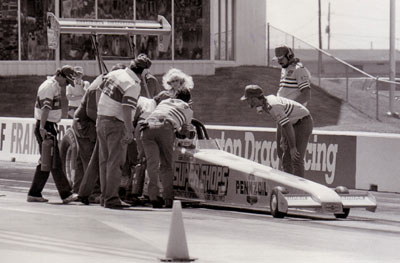
(Above) This was about as far as Hill got on three consecutive runs during qualifying after banging the blower on all three. (Below left) Out of blowers, Hill and crew chief "Fuzzy" Carter put their heads together, and, showing they still had a sense of humor, Carter even tried to get creative with one of Hill's old-school blowers (below right), but the team was rescued by its racing pals.
|
||
 |
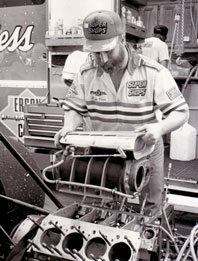 |
|
But, as noted earlier, Hill's histrionics almost didn’t happen at all. On three straight qualifying passes, Hill's Super Shops/Pennzoil dragster bombed the supercharger shortly after launching. Total under-power time: nine-tenths of a second. The team, nearing the end of a less-than-successful season, was ready to toss in the towel Saturday and head home without even making the final qualifying pass.
Here's how I summed up the situation in my National DRAGSTER coverage: "Bewitched by a midseason slump, bothered by the remnants of the flu, and bewildered by a series of baffling mechanical maladies, Hill … was out of parts, almost out of money, and completely out of answers."
Hill was a little more succinct but no less poetic in a press release that afternoon announcing the team's reluctant withdrawal from the event: "We got to the end of the money before we got to the end of the season."
The press release had no sooner been distributed at the event when the community that is drag racing rode to the rescue. Teams flocked to the popular pilot's pit with offers of parts and help. Mallory's Brian Clark -- working with Hill's red-bearded teddy bear of a crew chief, the ever-likable and sorely missed "Fuzzy" Carter -- traced the problem to an improperly grounded coil. Whiting loaned the team a supercharger; others offered valves and other spares.
Late in the final qualifying session, facing a 5.281 bump spot, the wily Texan, tuning on the basis of less than a second of data, punched his way into the show with a 5.036 to the thrill of the partial Texas crowd. In the cruelest of twists, it was Whiting whom he bumped from the field.
The .03 had earned the man they call "the Thrill" the No. 3 spot, and he followed with runs of 5.046 and 5.059 in the first two rounds to beat Dennis Forcelle and Darrell Gwynn.
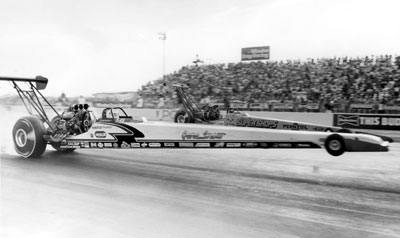
(Above) This semifinal battle of the sport's only four-second racers ended early when Snow's dragster lifted the front tires and smoked the rears. Hill made his first NHRA four-second run but wasn't done yet. (Below) In the final round, Hill broke their backs and put an exclamation point on his win with a jaw-dropping 4.93 after Joe Amato smoked the tires.
|
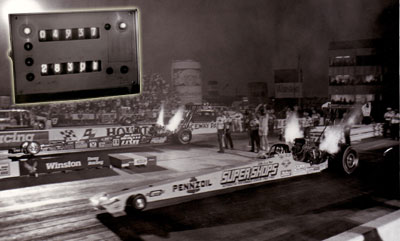 |
Hill and Snow squared off in the semifinals, where Snow's white and black dragster looked more as if it belonged on the launchpad at nearby Johnson Space Center, launching into a spectacular, tire-smoking wheelie that he rode for several hundred feet before shutting down and watching Hill not only win the round but also steal his low e.t. with a 4.990.
Hill's 4.990 was recorded six months to the day from his barrier-breaking Motorplex run, for which Snow also was in the other lane. Weird, huh?
Final-round opponent Amato and crew chief Tim Richards knew they were in trouble. They had run just 5.13 and 5.18 in the first two rounds, and their semifinal 5.07 conquest of Connie Kalitta had been on the verge of smoking the tires. "I don’t know that we can [try to] run a four without smoking the tires," Amato admitted dejectedly before the final, and he was right. Amato's red TRW machine smoked the hoops at the green, and he watched history unfold beyond his wind screen.
Hill's yellow charger went nuclear with a 4.936-second blast at 283.10 to emphatically seal the victory. Even his crew on the starting line seemed stunned when the number popped up on the scoreboard, and Carter whipped his red hat from his head and flung it into the air. The place went nuts.
The run was so good that it was too quick to be backed up by the earlier 4.99, which became the new record, but that didn’t bother Hill and company, who, like all of us, were drenched minutes later by a long overdue storm in the parched region.
"We even broke the drought, didn't we?" joked Hill.

(Above) Gene Snow pulled the chutes at the conclusion of his 4.99-second qualifying pass Thursday; it was the first four-second run at an NHRA national event. (Below) Pro Stock racer Frank Sanchez also earned a slice of history as the first driver in his class to run in the 7.2-second zone.
|
 |
Although Hill ended up being the star of the show, plenty of other things made that first Supernationals super. HRP was brand new then, having opened that summer and holding its first NHRA meet a month earlier, the Division 4 season-ending points meet, so no one quite knew what to expect, but it took us just one outing to discover that the national event had been appropriately named.
Snow's four was the early clue that we might be in for something special. To put it all into context, Snow was at the vanguard of the move toward a high-gear-only driveline that today is standard.
Ever-innovative Jim Head put it out there for everyone to see when he ran direct drive in his Funny Car in Memphis in early May, and Snow had converted his dragster before the next event, the Cajun Nationals. By year's end, the handwriting was on the wall, and nearly everyone n both classes was using the setup. Snow had just missed NHRA's first five at the U.S. Nationals, where he ran 5.006, but didn't miss in Houston.
But Snow was not the only star of qualifying in Houston as New York-based Pro Stock racer Frank Sanchez enjoyed perhaps the finest moment of his short career Friday when he became the first NHRA Pro Stock driver to break into the 7.2-second zone with a 7.294, which was low e.t. and a new national e.t. record for, oh, about a minute or so. One pair later, Bob Glidden powered his new Motorcraft Ford Probe to a 7.277. Glidden's run led what was the quickest Pro Stock field ever assembled, bookended by Frank laconio's 7.374. Glidden went on to win the race and lock up his ninth season championship with two races still to go.
The Funny Cars were part of the performance fray, too, as Ed "the Ace" McCulloch powered the Miller High Life/Larry Minor Olds Cutlass to the quickest run in class history, 5.252. Don Prudhomme, who had just installed a high-gear-only combo in the Skoal Bandit Trans Am, ran low e.t. of eliminations at 5.308, just a few ticks off his standing record of 5.305. Neither of them won, though; that honor went to Mike Dunn, who drove Joe Pisano's Cutlass past Bruce Larson in the final, 5.40 to 5.57. Dunn won the season's next race, too, the Fallnationals in Phoenix.
This article was originally published in the Dragster Insider column in 2009.
Hundreds of more articles like this can be found in the DRAGSTER INSIDER COLUMN ARCHIVE



